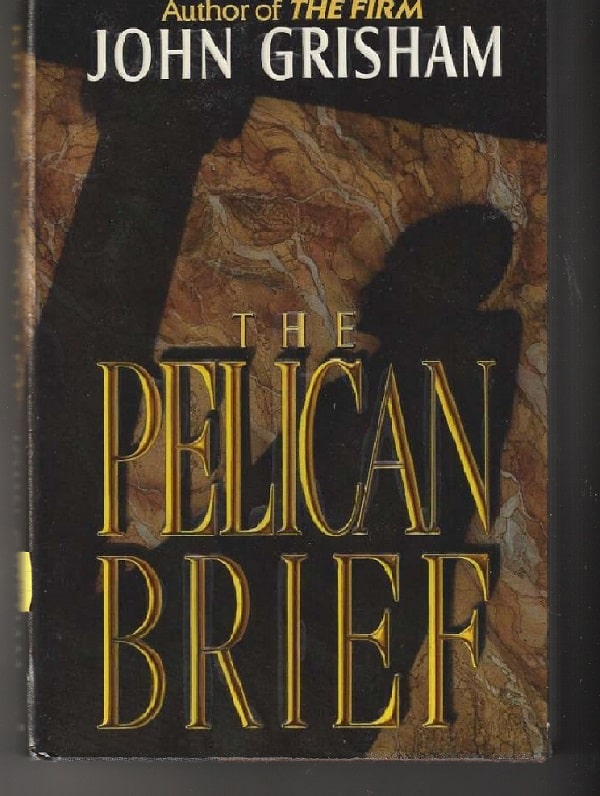As I was finishing John Grisham’s 1992 gripping legal thriller The Pelican Brief, I found myself warmly enjoying its reminder of how wonderful newspapering used to be.
The novel starts with the assassination of two U.S. Supreme Court Justices and moves into high gear when a legal brief, written by a Tulane University law student, Darby Shaw, sparks a rash of cover-up murders that has Darby running for her life.
Midway through the novel, she joins forces with Washington Post investigative reporter Gray Grantham to try to prove the allegations in the brief and, meanwhile, keep Darby from becoming another victim.
The story features Darby’s law professor and lover Thomas Callahan, a famed super-assassin named Khamel, a Deep Throat-sort of source known as Garcia, a shadowy operative called Rupert who is trying to track Darby, a slimy chief of staff to the President, several very evil lawyers and the rich guy behind the assassinations and the cover-up who’s slimier and more evil than anyone else on Grisham’s pages.

Then, after more than 300 pages of violent conspiracy and legal skullduggery with Darby at the center, the final pages have to do with Gray working to nail down the biggest story of his career and the biggest since the Watergate scandal two decades earlier.
Celebrations of journalism
It’s a high-paced rush to find and pull together the facts and documents necessary to enable Gray, his editors and the Post to bring the story to light, and, despite all the killers running loose, the book’s ending is reminiscent of the 1976 movie All the President’s Men, directed by Alan J. Pakula.
That film had to do with the real-life story of Bob Woodward (Robert Redford) and Carl Bernstein (Dustin Hoffman) uncovering piece by piece the scandals of the Nixon White House. In contrast, Gray Grantham’s revelations come in a single huge front-page story.
Despite the differences, however, both the Watergate film and the Grisham book give a sense of the hard work it takes to find the details of a story and then the excitement of getting the story ready and of making last-minute calls for comment and of seeing, finally, the story bannered across the front page as the papers are coming off the presses.
All the President’s Men is a thriller about political corruption, but it’s even more a celebration of journalism. So is the ending of Grisham’s The Pelican Brief.
A peck on the cheek
I was surprised by that because I’d seen the 1993 movie made from Grisham’s novel many times, and my memory was that it focused on the relationship of the two characters Darby Shaw (Julia Roberts) and Gray Grantham (Denzell Washington).
So, after finishing the novel, I watched the movie again, and, sure enough, the newspaper stuff is there at the end, but it’s overshadowed by the dance the two characters are enacting. That’s particularly interesting because the movie’s director is the same guy who directed All the President’s Men, Pakula.
The focus of the film version of The Pelican Brief is to get the viewer engrossed in the question of not just whether Darby and Gray will survive, but even more whether they will fall in love.
The intensity of the question is heightened because of what many at the time would see as the transgressive nature of a black man and a white woman in a romance. This was three decades ago when interracial romances on the screen were still rare. (In the novel, both are white.)
As it happens, Darby gives Gray a peck on the cheek and then they hug in one of the final scenes in the film. The question of whether something more romantic happens later is left up in the air. In contrast, the novel has the two of them hanging out together in some Caribbean hideaway.
Giving honor
The kind of exciting journalism that is depicted in Grisham’s gripping and well-paced novel and Pakula’s gripping and well-paced All the President’s Men is still practiced by a handful of newspapers.
Thirty years ago, though, when I was newspapering, many news organizations were able to attack stories with expert reporters who spent whatever time and energy was needed to nail down the facts. Now, most are struggling simply to stay afloat.
For anyone who loves newspapers, that’s been a sad development. In small measure, Grisham’s book gives honor to the way it used to be.
Patrick T. Reardon
9.19.22
Written by : Patrick T. Reardon
For more than three decades Patrick T. Reardon was an urban affairs writer, a feature writer, a columnist, and an editor for the Chicago Tribune. In 2000 he was one of a team of 50 staff members who won a Pulitzer Prize for explanatory reporting. Now a freelance writer and poet, he has contributed chapters to several books and is the author of Faith Stripped to Its Essence. His website is https://patricktreardon.com/.
